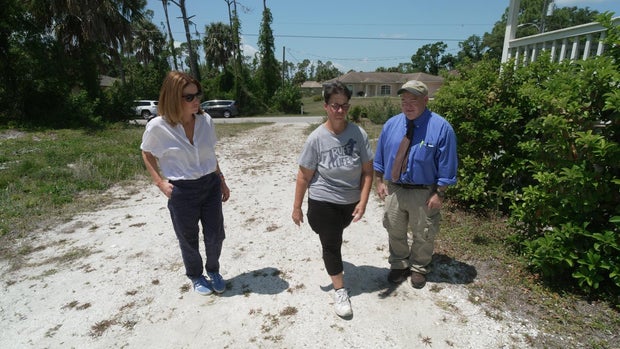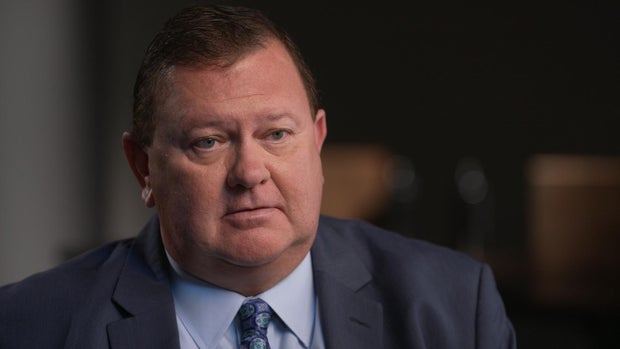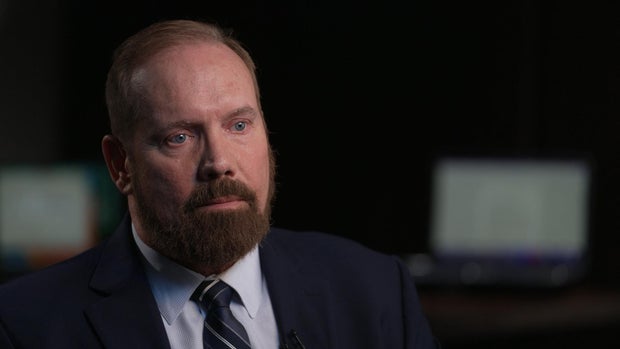CBS News
Whistleblowers claim insurance companies shortchanged some Florida homeowners after Hurricane Ian

On Thursday night, Hurricane Helene and its 140 mile an hour winds made landfall in Florida’s Big Bend region. It was deadly. The full extent of the damage won’t be known for weeks and residents know rebuilding after the storm is likely to be as daunting as the storm itself.
It’s been two years since Hurricane Ian hit Southwest Florida and an estimated 50 thousand homeowners are still locked in battles with their insurance companies. Tonight, you will hear from insurance insiders who say after years of diligently paying premiums, homeowners are being misled by their insurance carriers. The whistleblowers, who are all licensed adjusters, tell us after Hurricane Ian, several insurance carriers were using altered damage reports to deceive customers.
As Hurricane Ian slammed into Florida with 150 mile an hour winds, Jeff Rapkin took this video from the porch of his home… about 40 miles south of Sarasota.
Jeff Rapkin: (on recording): “All the trees are coming down… they don’t normally look like this, everything’s coming apart… My name is Jeff Rapkin, I live in North Port, Florida…”
Rapkin, an adoption attorney and his wife, Ginny, raised three children in this home and weathered more than a half dozen hurricanes inside it. But Ian, they say, was different.
Jeff Rapkin: It just– it sat above our heads. It wouldn’t move. I mean, it was a nightmare.
Sharyn Alfonsi: And it went on for how long?
Jeff Rapkin: Eleven hours.
Sharyn Alfonsi: Eleven hours.
Jeff Rapkin: It felt like the hurricane was inside the house. We couldn’t keep the windows closed.
60 Minutes
That is the Rapkin’s house. A neighbor just happened to be filming when their steel roof was ripped off. When the storm finally passed, the Rapkins could see clear skies through the new hole Hurricane Ian punched in their ceiling. There were trees on and around their house, the roof was shredded, and everything inside was soaked.
The Rapkins lined up their losses on the curb and called their insurance company, Heritage, to begin the claims process. It sent a licensed adjuster to the house to assess the damage.
Sharyn Alfonsi: Did you get the feeling, speaking to him and showing him around the property, that he understood —
Virginia Rapkin: Oh yeah.
Jeff Rapkin: Yeah.
Sharyn Alfonsi: — what was happening here, that this —
Virginia Rapkin: Oh yeah.
Sharyn Alfonsi: — was serious?
Jeff Rapkin: He was really nice. He was thorough and he said, “your house is probably gonna need to be completely rebuilt.”
Which is why the Rapkins were floored when they finally got a check from their insurance company three months later.
Jeff Rapkin: They sent us a report from the adjustor which said that it would cost $15,000 to put our home back to pre-hurricane conditions.
Sharyn Alfonsi: They sent you $15,000?
Jeff Rapkin: $15,000. And so– the– the deductible was taken out, so it was $10,000 dollars. And then our public adjuster took $1,000 out, so we had $9.
Sharyn Alfonsi: When you called and said, “$9,000? Are you kidding me?” What was the reaction?
Jeff Rapkin: The reaction was– “This is the decision we’ve made.” And I started to pray for– for Mr.– Jordan Lee’s untimely demise because I was so angry.
We found Mr. Jordan Lee… very much alive.
60 Minutes
Sharyn Alfonsi: Do you remember the Rapkin family?
Jordan Lee: Yes, ma’am.
Lee is the adjuster who went to the Rapkin’s home after the storm.
Sharyn Alfonsi: What do you remember about them?
Jordan Lee: Their property, a two-story home, metal roof that was blown off by Hurricane Ian. And the interior of the home was just– it was soaked.
Jordan Lee has been a licensed adjuster in Florida since 2017. After major disasters, most insurance companies use third-party firms who hire adjusters, like Lee, to help them with the thousands of claims.
Lee says after he assesses a home, he always leaves his cellphone number with the homeowners so they can call him if they have any questions. After Hurricane Ian, homeowners did.
Sharyn Alfonsi: What were they sayin’?
Jordan Lee: Cussin’ me out left and right, up and down. You know, “how could you do this to us?” It was really bad, actually. And out of the– the– thousands of claims that I’ve handled, I’ve never had phone calls like that.
Confused, he went back to compare the damage report he wrote for the Rapkins to the one the insurance company sent to them.
Sharyn Alfonsi: That’s your work?
Jordan Lee: Correct.
Sharyn Alfonsi: And this is what they were given?
Jordan Lee: Totally different. Totally different.
Sharyn Alfonsi: You said they needed a new roof.
Jordan Lee: I did.
Sharyn Alfonsi: And this report says what?
Jordan Lee: It reads as a repair.
Sharyn Alfonsi: Was that roof able to be repaired in your opinion?
Jordan Lee: Not in my opinion, no.
Later, Jordan Lee learned a desk adjuster – who’d never been to the Rapkin’s home – had deleted entire sections of his report… but left his name and his license number on it – making it look like his work.
Sharyn Alfonsi: Did anybody ever alert you, “Hey, we’re making a change to this report”?
Jordan Lee: No. Nobody told me. The only way that I knew was the homeowner calling me.
It is standard procedure for field adjusters to collaborate with those back in the office to make minor edits. But Jordan Lee says, that is not what happened with the Rapkin’s report.
Sharyn Alfonsi: Did you put a dollar amount on how much you thought they were owed?
Jordan Lee: $231,368.57.
Sharyn Alfonsi: What did the insurance carrier come up with?
Jordan Lee: $15,469.48. So uh, quite a bit of difference.
Sharyn Alfonsi: Mmm. That’s not a difference of opinion.
Jordan Lee: No.
Jordan Lee says as he dug further into his work from Hurricane Ian… he was stunned to discover the Rapkins weren’t the only family whose report was altered.
Jordan Lee: It was basically all of ’em. I mean, I handled 46 of them. 44 of them were changed.
Sharyn Alfonsi: Were any of your reports changed to give the policy owner more money?
Jordan Lee: No.
Sharyn Alfonsi: It was always down?
Jordan Lee: It was always down.
Down… by as much as 98%. One estimate he wrote for $488 thousand was changed to $13 thousand. another, from 239 to 3 thousand. On December 13th, 2022…
Jordan Lee (at hearing): “My name is Jordan Lee. I’m an independent insurance adjuster and I work for the insurance companies.”
Jordan Lee and two other adjusters testified to Florida lawmakers about what one watchdog group called “systematic criminal fraud” by the insurance companies.
Ben Mandell (at hearing): “The scheme was repeated over and over again, not only on my estimates but on estimates written by other adjustors.”
Ben Mandell has been a licensed adjuster since 2017. He did not work for Heritage but says 18 of the 20 reports he wrote for another carrier after Hurricane Ian were altered. And he says he, and other adjusters, were instructed by some of their managers to leave damage off reports.
Ben Mandell: It was a deliberate scheme to do this. And it wasn’t just with one carrier doin’ this. This was six carriers that we discovered were doing this in the State of Florida, they all got the memo.
Sharyn Alfonsi: Which was?
Ben Mandell: Which was, “we’re not going to replace roofs, asphalt shingle roofs. We’re not going to replace them, we’re going to repair them.”
Mandell says he refused to leave off roofs.
Ben Mandell: They were asking me to do something that was illegal.
Sharyn Alfonsi: And why was it illegal?
Ben Mandell: It’s illegal because when I go out to make a damage estimate, I have to put what the damage is, not what they want the damage to be. And so if I leave something off that’s supposed to be on there, I could be prosecuted for that.
Sharyn Alfonsi: So the company’s telling you, “Leave the roofs off, we’re not paying for roofs.” But you keep writing these–
Ben Mandell: That’s correct.
Sharyn Alfonsi: — roofs into your reports.
Ben Mandell: I wrote the way they’re supposed to be.
Sharyn Alfonsi: And you get fired.
Ben Mandell: And I got fired.
Now, Ben Mandell and five other whistleblower adjusters are represented by attorney Steven Bush. Bush worked as a public adjuster for more than a decade.
Steven Bush: What the carriers are doing, in some instances, what they’ve said was, “if the policyholder needs a new roof, then we’re gonna make them make us pay.” In other words, “File a lawsuit, and then we’ll pay you for your roof.”
60 Minutes
Sharyn Alfonsi: But unless they do that, they’re not getting their roof paid for?
Steven Bush: They’re not getting it, they’re not getting it. Most people will not stand up and fight. I cannot tell you how many people come to me and say, “hey, what was I gonna do? I had to replace my roof.”
Sharyn Alfonsi: And do you think the insurance companies know that? They’re betting on —
Steven Bush: Absolutely.
Sharyn Alfonsi: — that those people are just gonna roll over?
Steven Bush: No question they know that. They’re playing the odds and they are winning.
Florida’s insurance market has been a risky gamble for years. After a decade of costly storms, several national carriers exited Florida. Smaller, regional carriers stepped in… but not all were up to the job. Since 2021, at least nine insurance companies in Florida have collapsed and some of the remaining ones, Steven Bush says, altered damage reports.
Sharyn Alfonsi: And is it just in Florida?
Steven Bush: I now have evidence in six different states of where carriers are manipulating the estimates, changing them, and then misrepresenting to policyholders that it’s the work product of the field adjuster.
Sharyn Alfonsi: And did, most times, the policyowner have any idea?
Steven Bush: Policyowner has no clue.
Doug Quinn: Yeah, there’s almost no transparency in the claims process.
60 Minutes
Doug Quinn is the executive director of the American Policyholders Association, an advocacy group he started after his home was destroyed by Hurricane Sandy in 2012.
Doug Quinn: The victims of insurer fraud are the last people to find out that they were victims of insurer fraud.
Sharyn Alfonsi: So when the insurance carriers say, look, it’s our right, we’re allowed to go back in there and do what we want to these adjuster reports, you would say?
Doug Quinn: You are not allowed to take somebody who has dutifully paid premiums for years, and when they need their insurance, cheat them. And shave 70%, 80%, or 90% off their claim. You are not allowed to do that. You are allowed to disagree with, you know, the minutiae. But coming in to that degree and faking the facts on a claim is not acceptable and there should be legal consequences for that.
Steven Bush: If you really want to see change in the industry, put somebody in handcuffs.
Attorney Steven Bush says he turned over what he says is evidence of insurer fraud to state investigators and Florida opened a criminal investigation. but two years after the storm, Florida has made no arrests.
Sharyn Alfonsi: We know fraud’s investigated all the time when it comes to homeowners, right? You know, that if you put–
Doug Quinn: And contractors–
Sharyn Alfonsi: –a false claim–
Doug Quinn: –and public adjusters. Everybody’s who’s aligned with the consumer who costs the insurance industry money. Those cases get investigated and prosecuted rather quickly. And aggressively. All we are asking is that cases that are alleged to be perpetrated by the insurance carriers or the vendors that they hire are just as aggressively investigated and prosecuted when fraud is found.
Quinn says it’s difficult to know how many policyholders may have been given less money than they were owed. But two years after the storm, every unrepaired home and tarp tells a story. At the Rapkins, mold and mother nature are gnawing away at what’s left of their home. And upstairs?
Sharyn Alfonis (in attic): Oh, well, there’s the sky! This isn’t a hole, this is a crack down the middle of your house, I can put my whole arm up through here.
That split roof is an open wound for the Rapkins, who still have to mow the lawn and make mortgage payments on their rotting home every month. They’re also paying rent on an apartment nearby and $4,000 a year to Heritage for home insurance.
Sharyn Alfonsi: And you’re still paying?
Jeff Rapkin: I’m still paying.
Virginia Rapkin: Oh, yeah.
Jeff Rapkin: The premiums went up. (laugh) So we’re still paying– we’re still paying and the premiums went up. And I can’t get another insurance company, obviously.
Jeff and Ginny Rapkin filed a lawsuit against heritage accusing it of breach of contract and fraud.
In a statement to “60 Minutes,” Heritage said it couldn’t comment on specific policyholders but aims to “pay every eligible claim” and had no intention to deceive. The company says, in its own random sample, about 42% of damage reports were revised downward and 26% were revised upward.
Heritage says that since Hurricane Ian, it has made “many reforms,” including updating its claims processing software, which it blames for not including the names of desk adjusters who altered reports.
Sharyn Alfonsi: Do you think that was a mis– like, just an innocent mistake?
Jeff Rapkin: Originally I did. I said, “Oh, maybe they made an error.”
Sharyn Alfonsi: And what do you think now?
Jeff Rapkin: I think they did it on purpose. And I think people are getting letters that say they’re not covered when they are. This is a con. That’s what this is. This is: make them go away at all costs. We’re not paying.
Prior to 60 Minutes’ Sept. 29, 2024 broadcast, which featured correspondent Sharyn Alfonsi’s report on Florida insurance, we reached out to Heritage Insurance for comment on our story, “After the Hurricane.” The company responded to 60 Minutes with the following statement:
Produced by Oriana Zill de Granados. Associate producers, Emily Gordon and Kit Ramgopal. Broadcast associate, Erin DuCharme. Edited by Robert Zimet.
CBS News
Paris Hilton’s bill to protect minors at residential treatment facilities heads to president’s desk

Heiress, model and actor Paris Hilton is the force behind a bill headed to President Biden’s desk that’s aimed at preventing the abuse of minors at rehab and other residential facilities.
The House passed the Stop Institutional Child Abuse Act in a bipartisan 373-33 vote Wednesday, after the Senate passed the bill by unanimous consent earlier in the week. It’s a cause that’s personal to Hilton, who says she was abused at residential treatment facilities as a teen. Hilton lived in a series of residential treatment facilities from the age of 16, testifying before Congress in June that she had been violently restrained, stripped of clothing and tossed into solitary confinement, among other experiences.
“Today is a day I will never forget,” Hilton wrote on Instagram. “After years of sharing my story and advocating on Capitol Hill, the Stop Institutional Child Abuse Act has officially passed the U.S Congress. This moment is proof that our voices matter, that speaking out can spark change, and that no child should ever endure the horrors of abuse in silence. I did this for the younger version of myself and the youth who were senselessly taken from us by the Troubled Teen Industry.”
Now 43, Hilton has championed child protection legislation on Capitol Hill for years, encouraging lawmakers to pass regulations to help protect troubled teens from abuse at treatment centers. Hilton met with lawmakers on Capitol Hill this week, urging them to take up the legislation before the 118th Congress ends.
Democratic Sen. Jeff Merkley and Democratic Rep. Ro Khanna introduced the legislation in the House and Senate, and they were joined by Republican Sens. John Cornyn and Tommy Tuberville and Republican Rep. Buddy Carter.
“Children across the country are at risk of abuse and neglect due to a lack of transparency in institutional youth treatment programs,” Khanna said in a statement. “The industry has gone unchecked for too long. Paris Hilton and other survivors of abuse in this broken system have bravely shared their stories and inspired change. I’m proud to lead this legislation with my colleagues to protect the safety and well-being of kids.”
The legislation creates a federal work group on youth residential programs to oversee the health, safety, care, treatment and placement of minors in rehab and other facilities. It also directs the Department of Health and Human Services to make contact with the National Academies of Sciences, Engineering and Medicine to make recommendations about state oversight of such programs.
Hilton is the great-grandaughter of Conrad Hilton, who founded Hilton Hotels.
CBS News
ATF director on mission to disrupt violent crime in schools

Watch CBS News
Be the first to know
Get browser notifications for breaking news, live events, and exclusive reporting.
CBS News
U.S. begins to retaliate against China over hack of telecom networks

The Biden administration is beginning to retaliate against China for its sweeping hack of U.S. telecommunications companies earlier this year.
Last week the Commerce Department issued a notice to China Telecom Americas, the U.S. subsidiary of one of China’s largest communications firms, alleging in a preliminary finding that its presence in American telecom networks and cloud services poses a national security risk. The company has 30 days to respond, although the Commerce Department has not said what action it plans to take next.
The New York Times was the first to report the action, which is a direct response to China’s infiltration of telecom networks earlier this year. The China-backed hacking group known as Salt Typhoon penetrated the networks of numerous companies including Verizon, AT&T and Lumen Technologies, a U.S. official familiar with the matter told to CBS News in October.
It’s unclear what the impact on China Telecom would be, since the FCC has already limited China Telecom Americas’ ability to operate in U.S. communications infrastructure. In October 2021, the FCC revoked its license to provide phone services in the US.
The FCC found that China Telecom “is subject to exploitation, influence, and control by the Chinese government and is highly likely to be forced to comply with Chinese government requests without sufficient legal procedures subject to independent judicial oversight.”
China Telecom Americas has not responded to requests for comment.
U.S. law enforcement and intelligence officials are continuing to try to learn more about the scope of the hack, which targeted U.S. surveillance capabilities used for operations including wiretaps. U.S. intelligence officials routinely seek court authorization to use telecom systems like those targeted in the breach to collect information for law enforcement or national security probes.
One fear is that the cyberattacks could have allowed the hackers to access information about ongoing U.S. investigations — including those tied to China — through the collection of sensitive data and techniques.
China’s incursions into U.S. critical infrastructure — including water treatment plants and the electrical grid — have lawmakers on Capitol Hill and the incoming Trump administration warning of a more aggressive retaliatory posture going forward.
Rep. Mike Waltz, designated by President-elect Trump to be national security adviser, told Margaret Brennan on “Face the Nation” Sunday, “We need to start going on offense and start imposing, I think, higher costs and consequences to private actors and nation state actors that continue to steal our data, that continue to spy on us.”
Last month, Rep. Jim Himes, Democrat of Connecticut and the ranking on the House Intelligence Committee, issued a similar warning.
“We’re not just going to name and shame,” he said on “Face the Nation.” “We are going to go into their networks and give as good as we got.”












